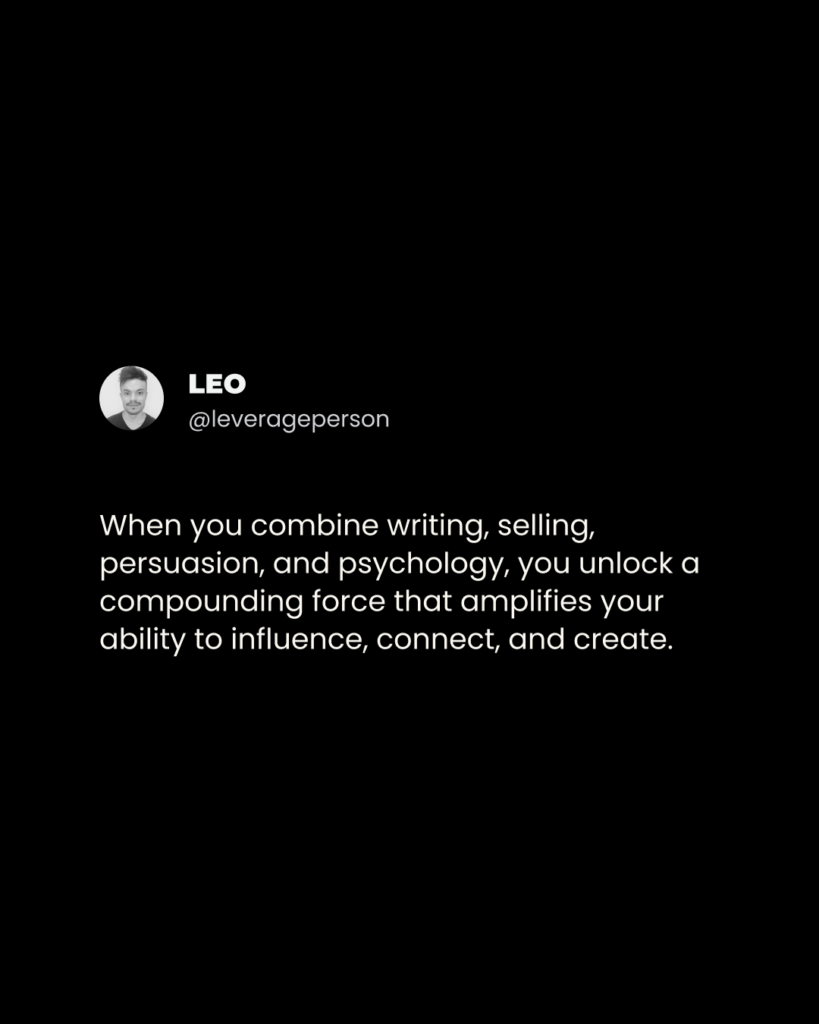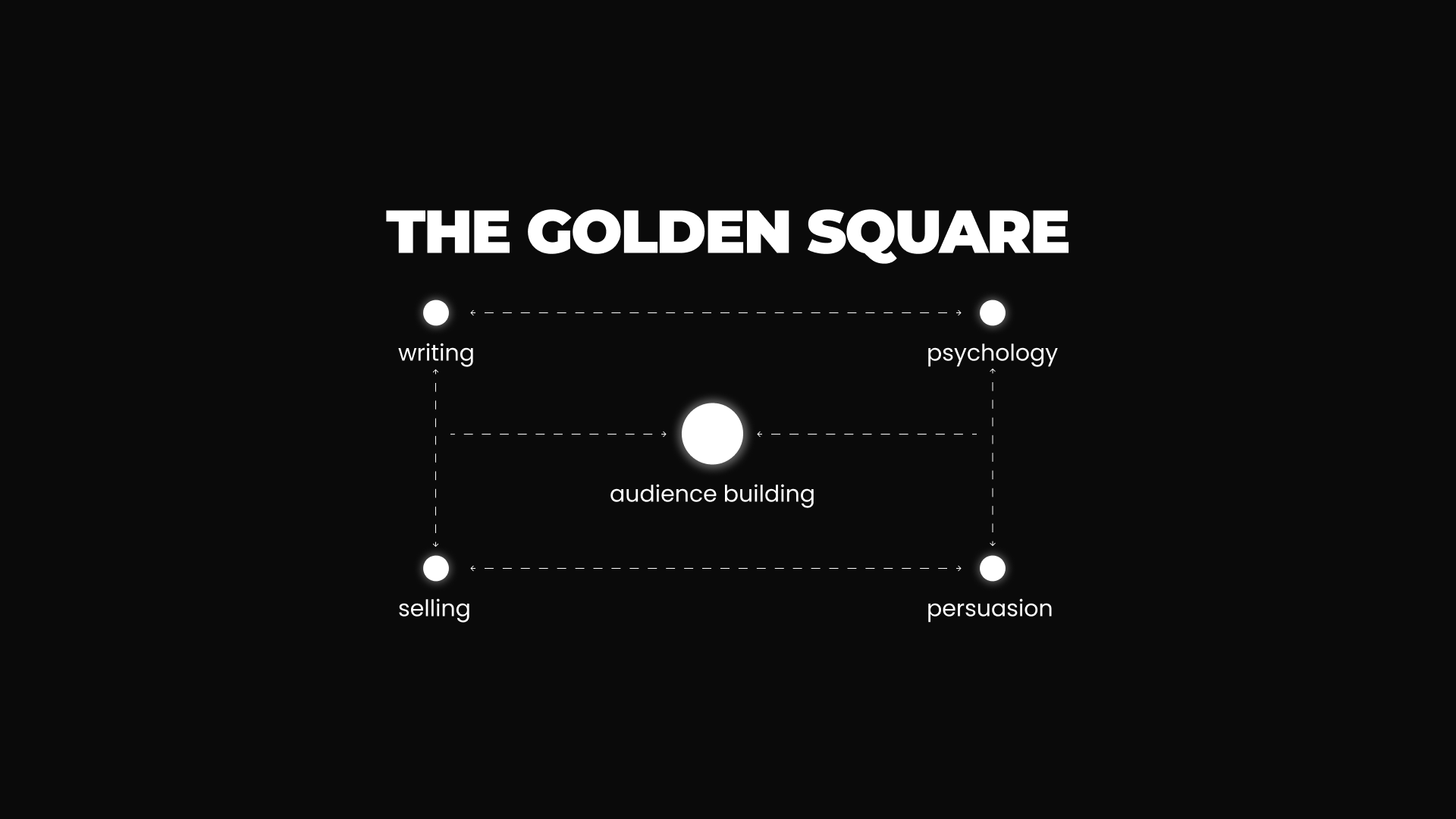Imagine this:
You’ve spent months perfecting your writing, yet your content doesn’t convert.
You’ve learned every sales trick in the book, but your pitch still falls flat.
You know how to tell a story, but it doesn’t inspire action.
What’s missing?
Most people dive into self-improvement, business, or creative pursuits with enthusiasm—only to hit a wall.
Why?
Because they’re missing the Golden Square: the four skills that compound into unstoppable momentum. Writing. Selling. Persuasion. Psychology.
The problem?
These skills are treated like isolated islands, but they’re not. They’re deeply interconnected, forming the foundation of influence and impact.
Without this foundation, here’s what happens:
- Your writing feels disconnected, lacking the power to drive decisions.
- Your sales pitches come across as pushy or irrelevant, leading to rejection.
- Your attempts at persuasion fall on deaf ears because they miss the emotional core.
- Your understanding of human psychology is shallow, so your efforts feel robotic.
This fragmented approach doesn’t just waste time—it holds you back from achieving what you’re truly capable of.
Here’s the truth:
Mastering just one skill can help.
But mastering all four?
That’s the game-changer.
Maybe you thought, “I’m being clear; why don’t they get it?”
Here’s why: Clarity alone isn’t enough.
The most common mistake people make is focusing on one skill while ignoring the rest.
You might:
- Hone your writing but forget how to sell the idea behind it.
- Master sales tactics but fail to connect emotionally with your audience.
- Learn about persuasion but neglect the psychology that drives human behavior.
This fragmented approach feels like trying to build a car with missing parts.
You push harder, but you’re still not moving forward. Frustration mounts, confidence dwindles, and the opportunity to make an impact slips away.
The truth is, these four skills—writing, selling, persuasion, and psychology — aren’t standalone tools.
They’re pieces of a puzzle, and without seeing how they fit together, you’ll always feel like something’s missing.
Consider this:
The world’s best communicators, entrepreneurs, and creators don’t just write compelling words or sell great products. They understand how to weave these elements into a seamless system.
They turn ideas into movements, words into action, and connections into conversions.
And here’s the kicker:
You can too — but only if you stop treating these skills like isolated tasks and start mastering the Golden Square as a cohesive framework.
What’s holding you back isn’t effort. It’s the way you’ve been taught to approach these skills separated instead of as a powerful, interconnected system.

Why Mastering the Golden Square Changes Everything
Now imagine this:
Your words don’t just inform — they inspire.
Your pitches don’t just sell — they connect.
Your content doesn’t just attract — it transforms.
This is the power of mastering the Golden Square.
When you combine writing, selling, persuasion, and psychology, you unlock a compounding force that amplifies your ability to influence, connect, and create.
Here’s how it works:
→ Writing gives you clarity.
You can take the most complex ideas and break them down into simple, actionable insights. Whether it’s a blog post, email, or a tweet, your words captivate because they’re clear and purposeful.
→ Selling makes your ideas irresistible.
You understand what your audience truly wants and frame your offer as the perfect solution. Instead of pushing, you guide them to say, “This is exactly what I need.”
→ Persuasion creates action.
You craft arguments that connect emotionally and logically, making it impossible to ignore your message. You’re no longer just informing; you’re moving people to act.
→ Psychology deepens your impact.
By understanding the drivers behind human behavior, you connect with your audience on a profound level. You don’t just communicate — you make them feel seen, understood, and valued.
Now, let’s zoom out and see the bigger picture:
Mastering these four skills doesn’t just make you better at your craft — it transforms how you approach life.
- In business, you create products and services that connects deeply with your audience.
- In relationships, you build trust and influence naturally.
- In personal growth, you understand yourself better by recognizing the patterns and drivers of human behavior.
This is the edge most people never develop.
They focus on one piece of the puzzle while the rest gathers dust.
But when you master the Golden Square, everything changes.
Here’s what’s possible:
- Your writing inspires action.
- Your offers sell effortlessly.
- Your messages persuade with clarity and conviction.
- Your insights into psychology allow you to connect authentically and deeply.
The Golden Square isn’t just a framework — it’s your blueprint for success in a world where influence and clarity are king.

Master the Golden Square in 30 Days
The Golden Square isn’t a checklist — it’s a transformation.
Writing, selling, persuasion, and psychology are not just skills you master; they’re the lenses through which you begin to see the world, communicate with it, and shape it.
Let’s break down each pillar, not as tasks to complete, but as layers of understanding you’ll integrate into everything you do.
Writing: The Art of Clarity and Influence
Writing is where everything begins.
It’s not just about words — it’s about translating the noise in your mind into clear, impactful communication.
Every great idea or product dies in the shadows if you can’t communicate it effectively.
When you write, you’re doing more than informing; you’re creating an experience. Think about the last time you read something that moved you.
Maybe it was a book, a thread, or even a simple email. The power of that writing didn’t lie in fancy language or clever metaphors — it was in its clarity. It showed you something you didn’t see before. It gave you words for emotions you hadn’t articulated yet.
To master writing, you must become a sculptor of ideas.
Strip away the unnecessary until the core message shines.
But clarity isn’t enough — you need to provoke action.
This is where structure comes in.
Frameworks like PASO (Problem, Agitation, Solution, Outcome) don’t restrict creativity; they guide it.
They help you deliver your message in a way that keeps readers hooked from start to finish.
Writing isn’t an isolated activity. It’s a dialogue, even if the reader doesn’t respond directly.
Every word you write should be purposeful, aiming to spark curiosity, inspire action, or deliver clarity.
This is the foundation of the Golden Square because if you can’t write well, the other skills crumble.
Selling: Understanding and Aligning with Human Desires
Selling isn’t about convincing — it’s about alignment.
The best salespeople don’t “push” their products. They uncover desires that already exist and position their offer as the bridge between where someone is and where they want to be.
At its core, selling is an act of empathy.
It requires you to step into someone else’s shoes and truly understand their world.
What are their fears? What keeps them up at night? What do they hope to achieve, even if they haven’t articulated it yet?
When you understand these things, selling becomes natural because you’re no longer selling a product — you’re offering a solution.
The misconception about selling is that it’s manipulative. But ethical selling is the opposite. It’s rooted in service.
It’s saying, “Here’s something I believe can make your life better.”
And then proving it.
Proof can take many forms: stories, examples, case studies, or even your own journey.
Here’s where writing and selling converge: every piece of content you create is a mini-sales pitch.
A tweet, a article, a video — all of them are opportunities to build trust and show your audience why you’re worth their attention.
Persuasion: The Bridge Between Emotion and Logic
While selling aligns with desires, persuasion brings those desires to life.
It’s the art of weaving emotion and logic into a tapestry so compelling that people can’t help but see things your way.
Persuasion is often misunderstood as manipulation.
True persuasion, however, is about empowering people to make decisions that benefit them. It’s about creating arguments that are so clear, so emotionally resonant, and so logically sound that the decision to act feels inevitable.
To persuade effectively, you must understand the two forces that drive every human decision: emotion and logic.
Emotion sparks action; logic justifies it.
Think about the last major decision you made. You probably felt it before you thought it through.
Persuasion harnesses this dynamic.
Social proof plays a significant role here.
When people see that others trust you, they’re more likely to trust you too.
Reciprocity is another key element: giving value freely makes people more inclined to give back.
Confidence ties it all together.
If you don’t believe in your message, how can you expect anyone else to?
Persuasion isn’t about pushing someone to act — it’s about removing the barriers that prevent them from acting.
When you master this skill, you don’t just sell products or ideas; you inspire transformation.
Psychology: Unlocking Human Behavior
If writing, selling, and persuasion are the tools, psychology is the blueprint.
It’s the understanding of why people think, feel, and act the way they do.
Without this foundation, the other skills lack depth and precision.
At the heart of psychology is the principle of awareness.
People exist on a spectrum of awareness about their problems and the solutions available to them. Some are unaware they even have a problem. Others know the problem but don’t know the solution.
Your job is to meet them where they are and guide them to the next step.
Consider this: Every decision a person makes is driven by pain or pleasure.
They either want to move away from discomfort or move toward something they desire.
When you understand this, your messaging becomes more targeted and impactful.
You stop talking about what you think is important and start addressing what they feel is important.
Psychology also teaches us about the power of simplicity.
The human brain craves clarity. When your message is cluttered or complex, it creates resistance. But when it’s simple and focused, it creates momentum.
By mastering psychology, you gain the ability to design experiences — whether through writing, products, or interactions — that resonate deeply and lead to action.
Why the Golden Square Works
Each of these skills — writing, selling, persuasion, and psychology — is powerful on its own.
But when combined, they create something greater than the sum of their parts.
Writing without persuasion is hollow.
Selling without psychology is blind.
Persuasion without writing is ineffective.
The Golden Square isn’t just about mastering four skills. It’s about creating synergy between them. This synergy is what transforms your ability to communicate, connect, and create impact.
If you embrace this framework and commit to practicing it daily, you won’t just improve — you’ll evolve.
The Golden Square isn’t just a toolset; it’s a mindset, a way of thinking and operating that compounds over time.
The journey begins with a simple commitment: 30 minutes a day. Dedicate time to practice one aspect of the Golden Square.
Write with clarity.
Study human behavior.
Reflect on your ability to persuade.
Each step builds on the last.
That’s all for this week.
Thank you for reading.

